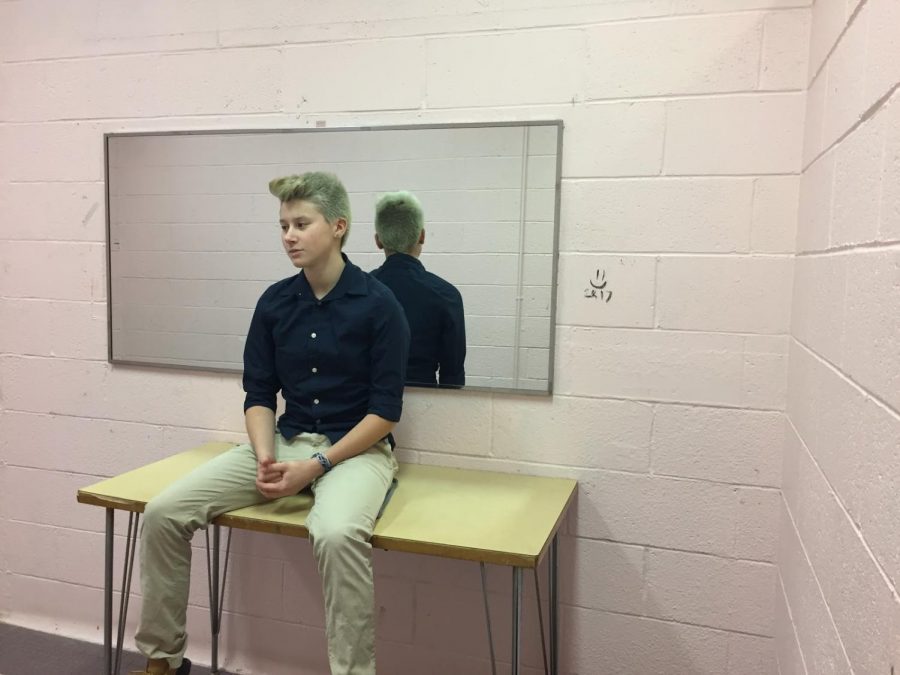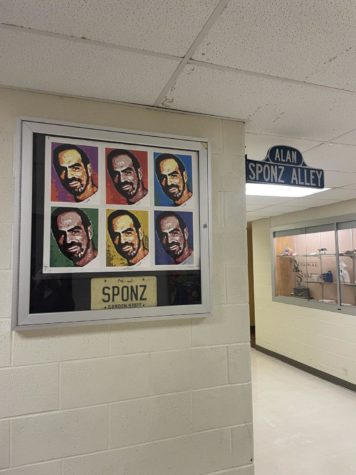Inside the mind of a boy: How Isabelle became Adam
Photo Credit: Sophie Molloy
Adam Dietrich sits in the girls bathroom after school hours at Glen Rock High School. Adam has helped the school community understand what it means to be a transgender person.
It’s not everyday that a grown man rushes out of the men’s restroom to announce to an entire restaurant that you, a teenager, are not, in fact, a man.
Adam Dietrich, a junior attending Glen Rock High School, is a transgender male. Beginning his transition in highschool, Dietrich has fought hard to get to where he is today.
But at first Dietrich was just confused. Beginning in the seventh grade, Dietrich first realized that he was attracted to girls more than guys. When he told his parents, they weren’t surprised by the news. However, it wasn’t cut and dry.
“It was fluid. I would go back and forth frequently between guys and girls and I don’t think that defined my sexuality,” Dietrich said. “I think it was just my interest at the time.”
Dietrich used the terms gender and sex with me often and, at first, I wasn’t aware that there was a difference between the two.
Art teacher Nicole Rusin, one of the advisers to the Gay-Straight Alliance club, explained that the two are quite distinct.
“Sex has to do with how you were born, so in other words, your assigned sex at birth. And I think that what we’ve learned, as a society or as a culture, is actually that gender isn’t always necessarily attached to what genitalia you were born with,” Rusin explained. “Your gender can be something that is in your brain rather than attached to your body.”
Someone’s gender identity could be completely different from what gender they are born with, according to Rusin.
Adam explained that gender and sex are two different things. Sex is what genitalia one has whereas gender is what one identifies as.
“Biologically, I’m female, so my sex is female,” Dietrich said. “But my gender is male because I identify as a man. If you’re going to get your sex legally changed you are going to have to go through sex reassignment surgery.”
Rusin said that she has always seen Dietrich for who he is.
“Adam never presented himself differently than he does now,” Rusin said. “I always saw him as him. There’s not much of a change in terms of gender roles, for me.”
Yet that newfound confidence emerged from a time of uncertainty and experimentation. Middle school was a confusing time for Dietrich. Since he was then identifying as a female, he switched between looks and was unsure about himself.
“I was confused. Needless to say one day I would come in in skinny jeans and red converse, super quirky like, gross. But then the next day I would come in in like cargo shorts and air jordans, and I would look like a butch lesbian like I didn’t know what was going on,“ Dietrich said.

Adam Dietrich, then known as Isabelle Dietrich, smiles for a class photo in elementary school.
In the eighth grade he came out to his friends as Bisexual. During one of his relationships, though, he realized that he was more masculine than his girlfriend. Deciding this wasn’t normal, he started to explore what it meant to be transgender.
“It started really small, like I started with the name change with what people called me at school, then the bathroom change, and the guys locker rooms, so like it snowballed,” Dietrich said.
Now he will be getting his name legally changed, receiving hormone therapy, and changing his gender-marker on legal state documents.
“It’s all coming into view, and I’m so happy and I’m so excited,” Dietrich said. “I’m like pissing my pants about it I’m so happy.”
Mentally and physically he’s progressed, which had a lot to do with the help of some of the online LGBT friends he has reached out to for help.
“I posted on my spam account, ‘Hey, I need help,’” Dietrich said. “A bunch of people responded and I started talking to them, and I started realizing what transgender was and how it applied to me.”
Dietrich said that he stills communicates regularly with a handful of them everyday.
Even with help from people who have gone through the same things he has experienced, high school has been unequivocally hard for Dietrich.
“Socially it’s been bad this entire time. I have had trouble navigating, socially, freshmen and sophomore year because I was coming out,” he said. “I was trying so many different things and I was a hot mess all through like the first half of high school.”
Dietrich’s parents wondered at first whether he was going through a phase. They were skeptical about his change. However, when Dietrich said “I need hormones,” he proved his certainty about needing a change and said that he was “not a girl.”
After that, they understood that this was what he wanted, and they told him they would put his happiness first. Although they didn’t know what transgender was when it came to gender or sex, he was able to educate them on what he was feeling and what other transgendered people were doing.
Yet even though they were supportive, it wasn’t all at once.
“They kept referring to me as she and using my birth name,” Dietrich said. “That killed me… It still affects me. It’s kinda like a rock in my shoe that I can’t get out. It’s always there and sometimes when I step on it, it’s obnoxious, but I’m trying to get the rock out of my shoe.”

Adam Dietrich takes a selfie in Dec. 2017.
Being seen as a guy to others is important to Adam. Yet it’s harder for people to see him as male because of his original gender. All the logistics of the transition process were hard for Adam, but he wasn’t on his own.
“GSA club made me realize that I wasn’t alone. Not necessarily trans but other people who were going through stuff, like people who are openly gay,” Dietrich said. “When they talk about their struggles coming out, I relate to some of that, like coming out is coming out. Everybody goes through the same thing. So it made me realize that there are people to talk to and I wasn’t going through it alone.”
Art teacher Troy Kroft, co-adviser of the GSA club, said that Dietrich’s influence of the GSA was immense.
“Adam has changed GSA more than GSA has changed Adam,” Kroft said. “Adam has helped us better understand issues, better understand how to be sensitive to the needs of transgender students.”
As one of the officers of the GSA, Dietrich has contributed to how the club is run today, and he helps the other officers understand the issues that transgender students may have on a daily basis.
Adam said some of those awkward situations sometimes make funny memories, regardless of how mortifying they are at the time.
Dietrich explained that, for transitioning individuals, there are small devices one can use to urinate into urinals if one does not have the right genitalia.
Dietrich was at a restaurant with his family when he was confronted about this device.
“I was standing taking a piss, and I take it off, and I’m trying to hide it behind my back,” Dietrich said. “And this guy was like, ‘Why did you just take your dick off?’”
Dietrich ignored the man and told himself not to worry about it. He went to rinse the device in the sink, but the man asked Dietrich whether he was actually a man
After Dietrich said that he was, the man then blatantly asked to see Dietrich’s genitalia to prove the point. When Dietrich didn’t show his genitalia, the man burst out of the bathroom and screamed to the restaurant, “There’s a chick in the bathroom!”
Dietrich sprinted to the table, and told his mother they needed to leave. She slammed down $60 to pay for the meal, and they “just bolted.”
This instance of gender humiliation is one of many that Adam has gone through. The more aware and accepting people are to transgender individuals, the more we can help people like Dietrich.
“I’m not a confident person, but I am 100 percent confident and sure of who I am and who I’m trying to be,” Dietrich said.

Sophie Molloy is a junior staff writer for The Glen Echo. She loves art, heated debates and the color Razzmatazz. If you ever need to find her, stop and...






